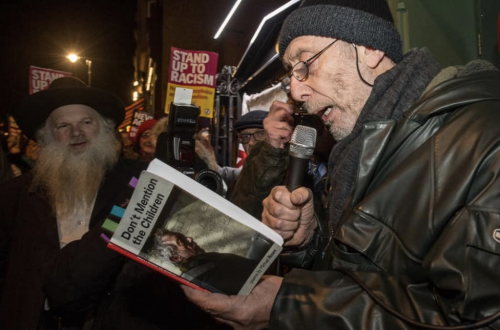This is a cross-post by Dr Paul Stott
This is my reply to the joint letter from Cage and a series of academics condemning the government’s Prevent strategy and the 2015 Counter-Terrorism Security Act. It takes point by point the elements of the open letter published in the Independent on Friday.
1.The latest addition to the United Kingdom’s counter-terrorism framework comes in the form of the Counter-Terrorism and Security Act 2015 (CTS Act). The CTS Act has placed PREVENT on a statutory footing for public bodies to prevent people from being drawn into terrorism by tackling what is claimed to be ‘extremist ideology’. In practice, this will mean that individuals working within statutory organisations must report individuals suspected of being ‘potential terrorists’ to external bodies for ‘de-radicalisation’.
Indeed – and they could have added here the somewhat sinister nature of this de-radicalisation. You must it seems change your views, an approach which in a liberal democracy from a government elected by its citizens, is deeply worrying. In a democracy, it ought to be the other way round – the government is informed by the people.
2. The way that PREVENT conceptualises ‘radicalisation’ and ‘extremism’ is based on the unsubstantiated view that religious ideology is the primary driving factor for terrorism. Academic research suggests that social, economic and political factors, as well as social exclusion, play a more central role in driving political violence than ideology. Indeed, ideology only becomes appealing when social, economic and political grievances give it legitimacy. Therefore, addressing these issues would lessen the appeal of ideology.
This is perhaps the weakest part of the statement. Whilst poverty and exclusion may be factors in terrorism, there is little evidence this is the case with Islamist actors. Al-Qaeda for example has always been a predominantly Saudi organisation – the richest, not the poorest country in the Middle East. The Caliph of the Islamic State, al-Baghdadi, reportedly has a PhD in Islamic Sciences, a virtually identical background to the key figure in the foundation of Al-Qaeda – Abdullah Azzam. British Jihadism is littered with the biographies of graduates and students who have travelled to Bosnia, Kashmir, Afghanistan, Iraq and Syria to fight, often at the expense of academic and professional careers. I would posit here it is the search for Islamic utopias, to live under sharia, rather than grievance about the removal of tax credits, which matters.
3.However, PREVENT remains fixated on ideology as the primary driver of terrorism. Inevitably, this has meant a focus on religious interaction and Islamic symbolism to assess radicalisation. For example, growing a beard, wearing a hijab or mixing with those who believe Islam has a comprehensive political philosophy are key markers used to identify ‘potential’ terrorism. This serves to reinforce a prejudicial worldview that perceives Islam to be a retrograde and oppressive religion that threatens the West. PREVENT reinforces an ‘us’ and ‘them’ view of the world, divides communities, and sows mistrust of Muslims.
Here Prevent is given an astonishing degree of power. How many people in the non-Muslim community have heard of Prevent? Around my way, discussion of it tends not to predominate in the local pub or café. With the exception of those professionally involved in the field, or politically active in related matters, Prevent is as well known among non-Muslims as academic studies of Slovenian foreign policy in the late 1990s. Yet we are informed it “divides communities and sows mistrust of Muslims?”
For this, I am afraid far more blame lies with the fringes of British Islam. Cage – one of the authors of this statement – spent the early part of the Syrian conflict informing all who would listen that Britain and Britons had nothing to fear from those going to fight Assad. This fiction was maintained even when it became clear most were joining Al-Qaeda’s al-Nusrah front or related jihadis. The murder of Alan Henning – a British aid worker killed for the sole reason he was not a Muslim – and the blood curdling threats made by British jihadis in Syria on social media to their homeland, did more to ‘divide communities’ and ‘sow distrust’ than Prevent ever could. How do the academics who signed this letter think it looks that more British Muslims fight in jihadist groups in Syria than are members of the UK armed forces?
The joint letter expresses deep concern that Islamic dress is being wrongly associated with terrorism, as part of a mis-directed focus on ideology. On one level, we do not know if such approaches, crass as they may seem, are justified. I would love to see a dataset on how many women, convicted of terrorism in the UK, wear the niqab? I would love to see a dataset on how many men, convicted of terrorism here, have wives who wear the niqab or hijab? I suspect the percentage will be very, very high.
The reality though, as expounded by academics such as Jennifer L Jefferis in “Religion and Political Violence” (2010) is that whilst deeply religious ideology does help us to explain violence, and why that violence is often so extreme, it paradoxically does not explain why others, with very similar beliefs do not turn to violence. Ironically Cage, a group of Taliban supporters involved in giving legal assistance to Salafi-Jihadis, provide a classic example of this conundrum. Why is it one group is involved in violence, and the other, is not?
4.While much of the PREVENT policy is aimed at those suspected of ‘Islamist extremism’ and far-right activity, there is genuine concern that other groups will also be affected by such policies, such as anti-austerity and environmental campaigners – largely those engaged in political dissent.
Back in 2010, West Midlands Police, and others around Prevent, were promoting the idea it had three prongs – animal rights extremism, far-right extremism and what was euphemistically described as ‘Al-Qaeda inspired’ extremism. Anything rather than use the terms Jihad or Islamism. This came back to bite the authorities on the bum when the Syrian jihad started, and Britons involved in ISIS were actually fighting Al-Qaeda. These are the type of awkward facts academics once covered in order to hold those in power to account – not it seems now.
Whilst noting the concerns of the joint letter here, I suspect they are unfounded, and most likely this is a vague attempt to gain unearned support from anti-austerity and environmental campaigners. Attempts at moving Prevent into other orbits have always looked ridiculous – in the summer of 2010 I gave a talk on ‘Animal rights extremism’ to a Prevent conference in Birmingham. The great and the good of the Birmingham Muslim community rubbed their beards in genuine confusion and could be heard asking “who is this guy, and why is he talking about guinea pig farms?’. Matthew Goodwin spoke, appallingly as it has nothing to do with terrorism, about BNP voting patterns. The whole thing was a nonsense, not least when Home Office figures in 2009 indicated that 92% of the those in prison for terrorism in Britain, affirmed themselves to be Muslim. Interestingly, and awkwardly for those who take the view ideology and belief is irrelevant, all are believed to be Sunni Muslims.
When faced with addressing violent trends within international Sunni Islam, or a few Greens thinking about picketing a BP depot, even the British ruling class should have the brains to work out which is the greater potential threat. Surely?
5.Without due reconsideration of PREVENT’s poor reputation, the police and government have attempted to give the programme a veneer of legitimacy by expressing it in the language of ‘safeguarding’. Not only does this depoliticise the issue of radicalisation, it shifts attention away from grievances that drive individuals towards an ideology that legitimises political violence.
Prevent has a poor reputation, as any government programme designed to change people’s beliefs should. But the language of social work is not confined to Prevent – infantilising language dominates discussion about British Muslims. For example, young people in the Muslim community are routinely referred to as ‘vulnerable’ to the wiles of extremist propagandists. This prompted the memorable retort from academic Anthony Richards that Prevent asks us to believe the country is threatened by ‘vulnerable’ people! Young people and especially British women never decide to go to the Islamic State of their own free will – they are instead ‘groomed’ or ‘lured’.
They are certainly being de-politicised, but what concerns me is not simply that grievances may be ignored, but that the academics who signed this letter appear so ignorant that religious utopias clearly matter to some young Britons.
6.PREVENT will have a chilling effect on open debate, free speech and political dissent. It will create an environment in which political change can no longer be discussed openly, and will withdraw to unsupervised spaces. Therefore, PREVENT will make us less safe.
Cheeky. Universities have long restricted, censored, blocked and discouraged. The far-right for example, has been denied the possibility to organise on UK campuses for at least forty years. In the last year, to take the example of my former institution the University of East Anglia, these restrictions spread to groups who are non-racist – UKIP and Class War. The Free Speech rankings for UK universities indicate that all is not, currently well.
Yes, Prevent, by extending the de facto ban on the far-right to Islamist speakers could make that worse, but the signatories of this letter make poor libertarians. To test this proposition, ask a few of the Islamists listed how they feel about Salman Rushdie’s rights to free speech and to dissent from the Islamic faith? Ask a few of the academics how they feel about Charlie Hebdo – the word ‘but’ will appear very quickly.
If the rallying call is to discuss ideas openly, count me in. I just don’t believe the signatories of this letter want that. For a minute.
7. We believe that PREVENT has failed not only as a strategy but also the very communities it seeks to protect. Instead of blindly attempting to strengthen this project, we call on the government to end its ineffective PREVENT policy and rather adopt an approach that is based on dialogue and openness.
Describing Prevent as ‘failed’ is an easy thing to do – no one has ever been able to develop an indicator or measurement of ‘success’ with such interventions.
It is not immediately clear what an approach of ‘dialogue and openness’ actually means here. Schemes much lauded in the past for taking this approach – for example the Met’s Muslim Contact Unit working in ‘partnership’ with Islamist and Salafist groups – brought clear gains in terms of real estate and influence for those currents; the gains for broader society were less clear. Indeed the support of such currents for the Syrian jihad suggest they were actually own goals.


